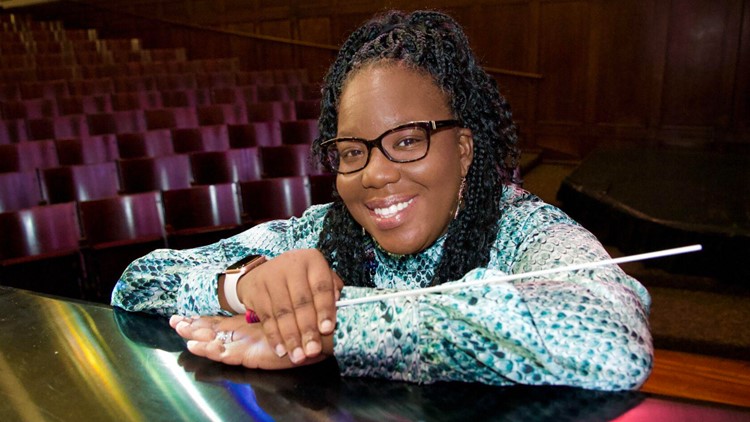ST. LOUIS — Maria Ellis’ aunts’ vocal prowess and range intrigued her so much that she would mimic their soprano stylings. Her aunts performed in a group with her father and other siblings.
Her family’s singing tradition inspired her to follow suit and she was a member of the family choir throughout her primary and secondary school years and at church. Her interest in classical music began in sixth grade after the St. Louis Children’s Choir introduced the genre to her.
“I thought I was really important because I got to read music,” Ellis said. “Sheet music is important because everything I was used to learning was learned by ear from my gospel background.”
Ellis said she enjoyed learning how to read music because it made her feel like “she was really doing something.” Her musical education continued at Millikin University for a year, and she returned home to work for AT&T.
The lessons learned were invaluable when she was offered an opportunity to “revamp” the Lively Stone Church of God’s children’s choir.
While the basic knowledge was there, she realized she didn’t have all the information she needed to teach the kids.
To gain more insight, she enrolled in the University of Missouri-St. Louis’ opera program, which is part of its music education department.
“I couldn’t speak the language,” she said. “I knew what I was doing but just didn't know the language for it.”
Opera had never been something she saw herself being involved in, but she did not back away from the challenge. She says she “fell in love” with singing operatic songs, and in time became a classical music conductor.
Her path motivated her to teach students about classical music in a way that was authentic to her. She used gospel, R&B and hip-hop references to bridge the two worlds. Her company, Girl Conductor, continues to follow that instructional formula.
She makes music education accessible and relatable to Black youth, especially Black girls, by utilizing hip-hop songs to help them read notes or by using a gospel song to teach them certain phrases taught by ear.
“I take classical terms and then break them down so people who don't come from that world can understand them because that's what I needed when I was in college,” she said. “I felt so lost because they were saying all these terms and I was like, ‘I don’t know what any of this stuff means.’”
Ellis also uses Beyoncé’s “Brown Skin Girl” to increase understanding of music intervals and the pitch distance between two notes. She recalls how in college her professors used the “Here Comes the Bride” song to describe intervals, but she found that method to be outdated because it is now rarely played.
“I want them to wonder, ‘is this Beyoncé or is it a [Johan Sebastian] Bach piece?’ It [sounds] like it could be Bach when in essence it's Beyoncé,” she said.
Ellis hosts a show on Classic 107.3 called “Bach & Beyoncé.”
“I was offered a radio show and they said ‘what do you wanna talk about?,’” she said. “And I said, ‘well I love Bach and Beyoncé, so I wanna talk about them and how their worlds intertwine.’ They’re not as separate as we think they are.”
Ellis knows there aren’t many women in classical music who look like her. However, several Black women paved a way for her and others to find a seat at the table. The problem, she says, is that these influences aren’t taught in school.
“We aren’t taught about the Black people who made contributions to classical music,” she said. “We’re only taught Bach, Beethoven, Mozart, and others. We don’t talk about all the African Americans in the United States who were writing operas and classical pieces like Florence Price, and Chevalier de Saint-Georges, who is said to have influenced Mozart.
She thinks The St. Louis Symphony Orchestra does a great job with diversity and inclusion. Last season, the symphony featured the works of several minority composers. She adds that there could be more works of Black women composers on the symphony’s schedule - which is a driving force behind Girl Conductor.
“I didn’t see Black women, I saw my first Black woman conductor in 2020,” she said. “When you think of orchestral conductors you think of white men. You don’t think of women at all, especially not Black women.”
Ellis will conduct works by St. Louis-native Dr. Robert Ray at Carnegie Hall on June 25.
“Since he’s from St. Louis I wanted to honor him since I’m also from St. Louis and St. Louis made,” she said. “I also wanted to honor him while he’s still living.”
For her Carnegie Hall debut, she would love to have students from The Sheldon’s all-star chorus (an ensemble made up of youth from low in-come households in North St. Louis County and St. Louis City) join her. Right now she’s in the process of raising money for them to be able to come.
Anyone interested in donating to Ellis, can email her at girlconductor@icloud.com.
Ellis is host of the weekly program Bach & Beyoncé; she’s also a conductor, musician, co-host of live SLSO broadcasts, and an educator at Sumner High School. She presents her unconventional teachings and ideas in workshops around the country.
Visit https://girlconductor.com/ for more information.
To watch 5 On Your Side broadcasts or reports 24/7, 5 On Your Side is always streaming on 5+. Download for free on Roku or Amazon Fire TV.


